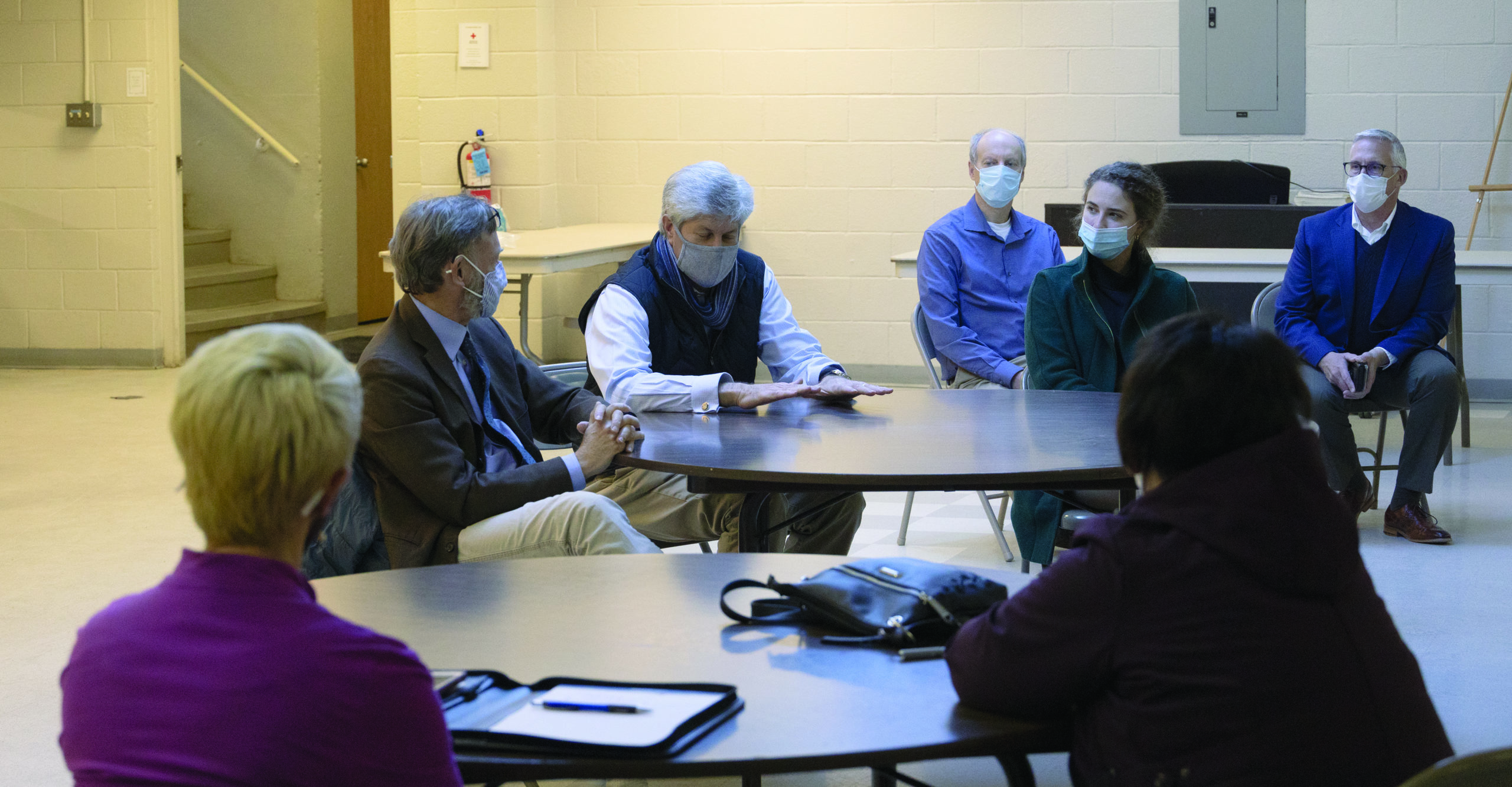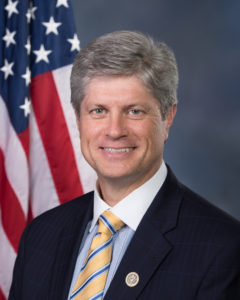
At center, Rep. Jeff Fortenberry (R) of Nebraska’s 1st congressional district makes a point at a townhall meeting last March at St. Mary Church in Bellevue, where he spoke about his then-forthcoming Care for Her Act. The legislation was introduced in the U.S. House of Representatives Sept. 3 with nine other Republicans as co-sponsors. MIKE MAY/STAFF
News
Fortenberry introduces Care for Her Act
October 13, 2021
By RON PETAK
Providing much needed resources and information to pregnant women, especially those facing unexpected pregnancies, is the aim of a bill that has reached the halls of Congress.
Introduced by Rep. Jeff Fortenberry (R), who represents Nebraska’s 1st district in the U.S. House of Representatives, the Care for Her Act was introduced Sept. 3 with nine other Republicans as co-sponsors.
“I am pleased that so many of my colleagues are joining with me to say we should be big enough and generous enough to care for a woman and her child who need help in times of vulnerability,” Fortenberry said in a press release timed with the introduction of the bill.
“This is our chance to support a woman with an unexpected pregnancy all the way through birth and child-rearing. Care for Her establishes a community of care for the journey of life.”
Continuing in the same news release, Fortenberry outlined key provisions of the bill.
“Care for Her ensures women know what services and support are available to them, including maternity housing, mentorship, and job training. It provides a ($3,600) tax credit to the pregnant mother with a pre-born child. And it provides performance incentives for communities that demonstrate improved maternal and child health outcomes.”
The tax credit is the same that is already in place for families with children under age 6.
The Care for Her Act’s commitment to women’s housing includes maternity support homes and accommodations on college campuses.
‘WE ARE HERE FOR YOU’
In a previous interview with the Catholic Voice about the bill, Fortenberry said providing support for women and their children from conception to child-rearing is a role in which government should participate.
“If we wrap her in a journey of care with support services, economically for health care, as well as for social needs, then we will go a long way towards saying again, we are here for you in this delicate moment,” Fortenberry said.
“We are here for your child, both before birth and afterward. That, from my perspective, should be the decided perspective of the government. And that’s the underlying purpose.”
Speaking earlier this year at a roundtable discussion at St. Mary Parish in Bellevue, Fortenberry was succinct as to why the Care for Her Act matters.
“One woman wrote to me and she said, ‘Well, Jeff, I had an abortion when I was young. And I read your piece and if I’d have had this type of series of services and support around me, I may have made another decision.’ That’s why we’re doing this,” he said.
ARRAY OF RESOURCES
At the crux of the bill is providing a multitude of resources and support to pregnant women, especially those facing unexpected pregnancies, through a collaborative approach between the federal and state governments.
Though states are not required to participate or provide financial support, the Care for Her Act calls for the creation of, among several areas outlined in the bill, a new federal-state entity called the Pregnancy Support Collaborative. According to the bill, the organization would create an information clearinghouse “to serve as a consolidated source of information on qualified public and private service providers that provide pregnancy and parenting support and services, including in low-income, urban, suburban, and rural areas.”
The collaborative would also be authorized to contract for establishment of a toll-free number to provide referrals to women for obtaining those services, including mental and emotional support services.
According to the Brookings Institution, a nonprofit public policy organization based in Washington, D.C., unintended pregnancies represent about 45% of all pregnancies, with about 40% of unplanned pregnancies ending in abortion.
The study also noted unintended pregnancies and births are most common among young unmarried women, especially teens and the most disadvantaged.
COMMUNITY OF CARE
Fortenberry’s passion to provide for pregnant women was evident Sept. 24 during an address in the House chamber. In concluding his comments on the so-called Women’s Health Protection Act, which would codify the “right” to abortion and override state restrictions on abortion, Fortenberry made an impassioned plea to his colleagues.

Rep. Jeff Fortenberry
“When there is news of an unexpected pregnancy and that vulnerable moment of uncertainty, suppose that we as a community of care, committed – committed – to the journey of life before birth, at birth and after birth,” he said. “That’s called commitment. That’s called compassion. That’s called love. That’s called care for her.”
David Zebolsky, chairman of Nebraskans Embracing Life, said the Care for Her Act should garner bipartisan support “since abortion advocates are so often critical of what they perceive as lack of support for a mother and child after birth.
“This is government functioning at its best, delivering resources to support the most innocent as well as their mothers,” he said.
‘INFORMATION IS POWER’
One of the bill’s co-sponsors, Republican Rep. María Elvira Salazar of Florida, was quoted in Fortenberry’s news release saying that the bill offers needed information and support to pregnant women.
“Information is power and far too many expecting women in our community are unaware of the many local, specialized resources available to them,” she said. “I raised my two girls as a single mom and I’m proud to join my colleagues to introduce the Care for Her Act to empower expecting mothers by taking a more holistic approach to supporting their needs and providing as many resources as possible.”
In addition to Salazar, also listed as co-sponsors of the bill, all Republicans, are Ann Wagner (Missouri), Elise Stefanik (New York), Liz Cheney (Wyoming), Claudia Tenney (New York), Young Kim (California), Blake Moore (Utah), Nicole Malliotakis (New York) and Jennifer Gonzalez-Colon (Puerto Rico).
There is no timetable for the bill’s progression, though House committee hearings, including those in the Ways and Means, Energy, and Commerce committees, will be held before the bill can advance.